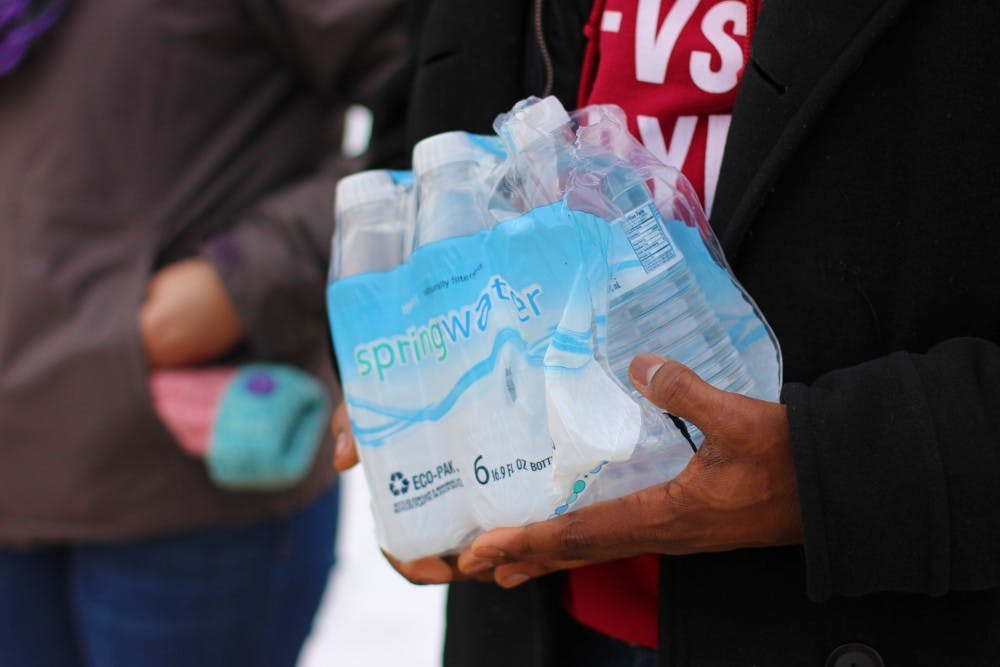Faculty creates documentary on Flint water crisis

When he was in Flint, Cedric Taylor met a mother who was overwhelmed with guilt after encouraging her child to drink water.
Her child had a health issue, and the mother thought drinking water would help. The child now has a high concentration of lead in her system.
Taylor, a sociology faculty member, said stories like this are common. He's been working on a documentary, which is set to finish in summer 2017, about the Flint water crisis. He hopes it will be aired on public broadcasting stations across the country.
He and his film partner, Daniel Bracken, are in control of shooting and directing the film. Bracken was a producer of "America: From the Ground Up," a Michigan Association of Broadcasters award-winning documentary series that aired on PBS. Central Michigan University's public broadcasting station WCMU is assisting with production.
What made you interested in documenting the Flint water crisis?
TAYLOR: I started looking at Detroit. I was interested in how the residents there are dealing with symptoms of overall economic difficulties. Water has been one of those issues. After having gone to Detroit and speaking with some activists, we realized the water issue is pretty bad. The water had been cut off. Pretty soon I realized this water issue had expanded beyond Detroit.
Will the documentary focus solely on Flint?
Michigan has such an abundance of water. When I heard about people not having access to a basic human right, I couldn't understand. The first episode looks a lot at some of the common scenes that we see in Detroit, in Highland Park and Flint. The second episode is going to be looking at water issues in rural parts of Michigan; they have their own crisis that nobody hears about.
When you go to Flint to film, what stands out the most?
The idea of young people being poisoned is revolting. Actually being there and talking to families who have been drinking the water and seeing some of the health issues, that is heartbreaking. Seeing parents so frustrated, angry and guilty for feeling that they are responsible for exposing their children to the water — that's heartbreaking.
We've captured some very powerful testimony. Without a shadow of a doubt, there is anger. They're frustrated, and understandably so. They're talking about their kids. They're feeling any potential that their kids have is taken away. They feel powerless. They're already in poverty. And now this happens. It's like you're already on the ground, and someone comes and kicks you in the face.
What kind of work goes into making a long-form documentary?
It takes a lot of research. The documentary, especially if it's one hour or longer, it allows you to delve into more detail. It's a lot of getting contacts, getting people to agree to be interviewed. Access to people who are in the know and affected by a particular issue, that's a big part of our storytelling.
You want people who are engaging and people who have knowledge of a particular situation. You also need to visit sites and have an idea of your collection of shots — where you are going to shoot, how you will shoot things.
Then after all the shooting is done, and this depends on the topic, you have to edit all the footage you have. That could be a very demanding process. When you edit, that's where a lot of the story begins to come out. You could have maybe 400 hours of footage that you have to whittle down to 60 minutes.
Why is making this documentary important to you and your team?
This documentary has been done in conjunction with WCMU. They are producing it. Also, the College of Humanities and Social and Behavioral Sciences. Those two entities are cooperating as far as production is concerned.
I think CMU needs to be in this conversation. They recognize that. (CHSBS Dean) Pam Gates and WCMU — there's a sense of obligation that we should be doing something. Many of our students are from these affected areas.



